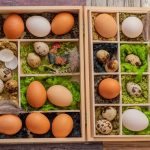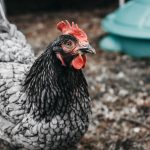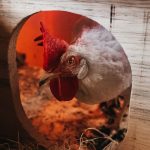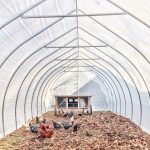Chickens naturally lay eggs during the warmer months, typically from spring to early fall, due to their reproductive system’s sensitivity to daylight. As days shorten in fall and winter, chickens reduce or cease egg production to conserve energy and resources. This natural cycle is influenced by the amount of light they receive.
The egg-laying process in chickens is closely tied to daylight exposure. Shorter days in autumn and winter trigger a decrease in egg production, a biological response to changing seasons. This adaptation allows chickens to preserve energy during colder periods when resources may be scarce.
For chicken keepers interested in maintaining egg production during winter, understanding this natural cycle is essential. Recognizing the biological factors involved enables informed decision-making about supporting the flock’s egg-laying efforts in colder months. This knowledge can guide strategies to potentially extend or modify the natural egg-laying season of chickens.
Table of Contents
- 1 Providing proper nutrition and supplements for winter egg production
- 2 Creating a warm and comfortable environment for your chickens
- 3 Implementing artificial lighting to stimulate egg production
- 4 Managing the flock’s health and wellness during the colder months
- 5 Adjusting feeding and watering schedules for winter egg laying
- 6 Considering alternative breeds or hybrids for increased winter egg production
- 7 FAQs
- 7.1 What factors can affect a chicken’s egg production in the winter?
- 7.2 How can I ensure my chickens continue laying eggs in the winter?
- 7.3 What should I feed my chickens to help them lay eggs in the winter?
- 7.4 How can I keep my chickens warm in the winter?
- 7.5 Are there any health issues I should be aware of when keeping chickens laying in the winter?
Key Takeaways
- Chickens naturally lay fewer eggs in the winter due to decreased daylight
- Supplementing with high-protein feed and calcium can help maintain egg production in winter
- Providing a draft-free coop with proper insulation is essential for keeping chickens warm
- Artificial lighting can be used to extend daylight hours and stimulate egg production
- Regular health check-ups and proper nutrition are crucial for maintaining flock wellness in winter
- Adjusting feeding and watering schedules to accommodate for colder temperatures is important
- Consider alternative breeds or hybrids known for their ability to lay eggs consistently in winter
Providing proper nutrition and supplements for winter egg production
Nutrition for Egg Production
To support winter egg production, it’s essential to provide your chickens with a balanced and nutritious diet. During the colder months, chickens may require additional nutrients to support egg production and overall health. Supplementing their diet with calcium, protein, and essential vitamins and minerals can help support their reproductive systems and encourage egg-laying.
Supplementing with Fresh Greens
Providing access to fresh greens, such as kale or spinach, can help supplement their diet and provide essential nutrients that may be lacking in their regular feed. This can help support their overall health and egg production during the winter months.
The Importance of Calcium
In addition to a balanced diet, supplementing your chickens’ feed with calcium can help support their egg-laying efforts during the winter months. Calcium is essential for strong eggshells, and providing a supplemental source, such as crushed oyster shells, can help ensure that your hens have the necessary nutrients to produce quality eggs.
Creating a warm and comfortable environment for your chickens

During the winter months, it’s important to create a warm and comfortable environment for your chickens to encourage egg production. This can be achieved by providing adequate insulation in the coop, ensuring that it is draft-free, and providing supplemental heat if necessary. Additionally, providing plenty of bedding and nesting material can help keep your chickens warm and comfortable during the colder months.
Ensuring that your chickens have access to clean water at all times is also crucial, as dehydration can negatively impact egg production. In addition to providing a warm and comfortable environment in the coop, it’s important to ensure that your chickens have access to outdoor space during the winter months. Allowing your chickens to spend time outside can help them get natural sunlight, which can help stimulate egg production.
Additionally, providing access to dust baths can help keep your chickens clean and healthy during the winter months.
Implementing artificial lighting to stimulate egg production
One way to encourage winter egg production is by implementing artificial lighting in the coop. By providing additional light in the early morning or evening hours, you can simulate longer daylight hours and encourage your chickens to continue laying eggs during the winter months. It’s important to gradually introduce artificial lighting to avoid stressing your chickens, and to ensure that they still have a period of darkness for rest.
In addition to artificial lighting in the coop, it’s important to provide access to natural sunlight for your chickens during the winter months. Allowing your chickens to spend time outside during the day can help them get the natural light they need to stimulate egg production. Additionally, providing access to dust baths can help keep your chickens clean and healthy during the winter months.
Managing the flock’s health and wellness during the colder months
During the winter months, it’s important to pay close attention to your flock’s health and wellness in order to support winter egg production. Cold temperatures and wet conditions can increase the risk of respiratory infections and other health issues in chickens. Providing regular health checks and monitoring for signs of illness can help ensure that your flock remains healthy and productive during the winter months.
In addition to monitoring your flock’s health, it’s important to provide regular opportunities for exercise and mental stimulation during the winter months. This can be achieved by providing access to outdoor space, enrichment activities, and opportunities for social interaction with other chickens. Keeping your flock active and engaged can help support their overall health and well-being, which in turn can support winter egg production.
Adjusting feeding and watering schedules for winter egg laying

Supporting Egg Production with Nutritious Feed
Chickens require additional nutrients and energy during the colder months to maintain their egg-laying efforts. Providing access to high-quality feed is crucial for supporting their reproductive systems during the winter months.
Ensuring Access to Clean Water
In addition to adjusting feeding schedules, it’s vital to ensure that your chickens have access to clean water at all times during the winter months. Cold temperatures can increase the risk of dehydration in chickens, so it’s essential to regularly check water sources and ensure that they are free from ice and debris.
Preventing Water Freezing
Providing warm water or using heated waterers can help prevent water from freezing during the colder months. This is especially important to maintain your chickens’ hydration and overall health.
Considering alternative breeds or hybrids for increased winter egg production
If you’re struggling to encourage winter egg production in your current flock, it may be worth considering alternative breeds or hybrids that are known for their ability to lay eggs consistently throughout the year. Some breeds, such as Rhode Island Reds or Leghorns, are known for their strong egg-laying abilities and may be better suited for winter egg production than other breeds. Additionally, hybrid breeds that have been specifically bred for high egg production may also be a good option for chicken keepers looking to increase winter egg production.
In addition to considering alternative breeds or hybrids, it’s important to consider the individual characteristics of your flock when trying to encourage winter egg production. Some hens may naturally be more inclined to lay eggs throughout the winter months, while others may require additional support and encouragement. By understanding the unique characteristics of your flock, you can make informed decisions about how best to support their egg-laying efforts during the colder months.
In conclusion, supporting winter egg production in your flock requires a combination of understanding their natural egg-laying cycle, providing proper nutrition and supplements, creating a warm and comfortable environment, implementing artificial lighting, managing their health and wellness, adjusting feeding and watering schedules, and considering alternative breeds or hybrids. By taking these factors into consideration and making informed decisions about how best to support your flock during the colder months, you can encourage consistent egg production throughout the year.
If you’re looking for ways to keep your chickens laying in the winter, you may also be interested in learning about how to insulate a chicken coop. Insulating your coop can help regulate the temperature and keep your chickens comfortable during the colder months, which can in turn help maintain their egg production. Check out this article on how to insulate a chicken coop for more tips on creating a cozy environment for your flock.
FAQs
What factors can affect a chicken’s egg production in the winter?
Factors that can affect a chicken’s egg production in the winter include decreased daylight hours, colder temperatures, and changes in diet and water intake.
How can I ensure my chickens continue laying eggs in the winter?
To ensure your chickens continue laying eggs in the winter, provide them with a warm and dry coop, adequate lighting to simulate longer daylight hours, and a balanced diet that meets their nutritional needs.
What should I feed my chickens to help them lay eggs in the winter?
In the winter, it’s important to provide your chickens with a balanced diet that includes a higher protein content to support egg production. This can include commercial layer feed, as well as supplemental sources of protein such as mealworms or black soldier fly larvae.
How can I keep my chickens warm in the winter?
To keep your chickens warm in the winter, ensure their coop is well-insulated and free from drafts. Provide them with plenty of bedding, and consider using a heat lamp or heated waterer to help maintain a comfortable temperature.
Are there any health issues I should be aware of when keeping chickens laying in the winter?
In the winter, chickens are more susceptible to respiratory issues and frostbite. It’s important to monitor their health closely, provide them with a clean and dry environment, and take steps to prevent frostbite on their combs and wattles.
Meet Walter, the feathered-friend fanatic of Florida! Nestled in the sunshine state, Walter struts through life with his feathered companions, clucking his way to happiness. With a coop that’s fancier than a five-star hotel, he’s the Don Juan of the chicken world. When he’s not teaching his hens to do the cha-cha, you’ll find him in a heated debate with his prized rooster, Sir Clucks-a-Lot. Walter’s poultry passion is no yolk; he’s the sunny-side-up guy you never knew you needed in your flock of friends!







